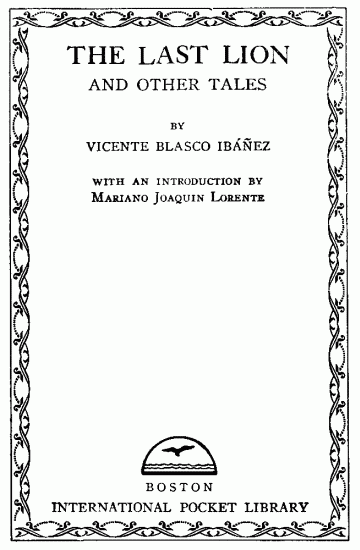INTERNATIONAL POCKET LIBRARY
EDITED BY EDMUND R. BROWN
Copyright, 1919, by
JOHN W. LUCE & COMPANY
Reprinted by arrangement with John W.
Luce & Company. All Rights Reserved.
First printing, 2,000 copies
Second printing, 5,000 copies
Third printing, 10,000 copies
PRINTED IN THE UNITED STATES OF AMERICA
BY THE COLONIAL PRESS INC.,CLINTON, MASS.
THE LAST LION AND OTHER TALES
VICENTE BLASCO IBÁÑEZ
DON Vicente Blasco Ibáñez was born on the 29th of January, 1867, in thecity of Valencia, that same picturesque sunshiny Valencia which wascaptured from the Moors by the formidable Cid a little over eightcenturies ago. But Blasco Ibáñez is a valenciano only by birth, forhis family came from the old kingdom of Aragon.
The Aragonese are a sturdy, hardworking, adventurous people, somewhatstubborn, suicidally valorous, passionately independent, fanaticallyreligious, fond of music and of the honest pleasures of life. Theiradventurous spirit led them in ages gone by as far as Asia Minor, where,with the Catalonians, they gave a good account of themselves. Theyfought against the Moors as doughtily as did the Castilians, and whentheir kingdom was united to that of Castile, under Isabella andFerdinand, Granada was conquered and Mahomedan domination in Spainceased for ever. The great Napoleon had no fiercer antagonists than theAragonese, and when, after two sieges, his troops took Saragossa, theyfound in it nothing but corpses and ashes. The Aragonese were so jealousof their liberties that when one of their kings was being crowned, theChief Justice of Aragon, addressing His Majesty in the familiar form,reminded him that they, the people, were greater than their king,"somos más que tu".
Of his Aragonese ancestry, we find in Blasco Ibáñez the intense love offreedom, the adventurous spirit and the untiring energy for work.
Blasco Ibáñez was not born with a silver spoon in his mouth; his earlieryears were a continual struggle for existence in which he made a closeacquaintance with poverty and even hunger. He followed many trades andoccupied, after a hard hunt, minor clerical positions. Yet, he managedto study law and at the age of eighteen he was a full fledged lawyer.
His studies may have impressed him with the august majesty of the law,but did not imbue him with any respect for the then existing government,and he proceeded to write a sonnet which gave full vent to his contemptfor it.
Considering that many sonneteers escape the gall

